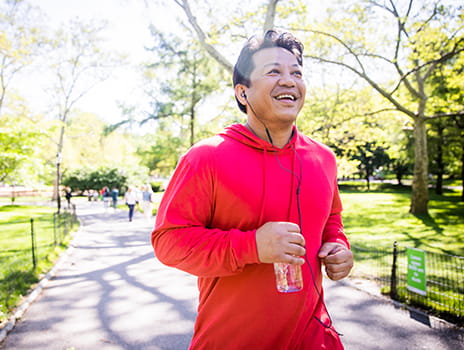March 19, 2020
For many people, times of uncertainty can trigger feelings of anxiousness, concern and confusion. Greg Nawalanic, Psy-D, clinical director of psychology services at The University of Kansas Health System Strawberry Hill Campus, shares his tips for reducing anxiety and improving overall mental health.
During critical times, such as the COVID-19 pandemic, it’s important to:
- Acknowledge your anxiety: It’s completely normal to feel the strain of the unknown. Anxiety can actually increase in response to one's efforts to ignore or repress it. When you feel the next wave of anxiety coming on, try to acknowledge it and accept it as a reasonable part of the experience. Interestingly, the more you are able to face the anxious feelings in the moment, the less anxiety you will feel over time.
- Stay informed without going overboard: Consuming too much news can be a trigger for anxiety. Try limiting yourself to a half hour of reading or watching each day. Through this small change, you can become more effective in completing your daily tasks and staying present in your relationships. You can reduce your anxiety while still remaining properly informed.
- Exercise personal responsibility: In times of a crisis like this, it’s important to adhere to guidelines and suggestions from infectious disease experts. By doing this, you gain a sense of control over the unknown, which is often a trigger for anxiety and emotion-driven reactions.
To reduce stress and anxiety, try incorporating these activities into your daily routine:
- Shift your focus. Rather than focusing on what you cannot control, try looking at setbacks as opportunities for growth and self-discovery. Crack open a good book, watch a new TV show, draw, paint, learn to play a new instrument or engage in an activity you’ve always wanted to try.
- Exercise. Getting outside and going for a walk, run or bike ride is one of the best ways to reduce anxiety. Exercise releases the "feel-good" chemicals in your body and can help support a healthy immune response.
- Breathe. You don't have to be a yogi to experience the benefits of turning down the noise in your life. Try doing some deep breathing or meditation exercises for 5-10 minutes first thing in the morning and set an intention for the day. In the evening, do the same thing, and use that time to reflect on your growth.
- Eat well. During stressful times, research shows we tend to reach for comfort foods, which can often make us feel worse. Instead, try incorporating lean meats or fish, fruits and vegetables into your diet.
- Sleep. Getting a good night's sleep can be a challenge for people with anxiety. Avoid watching TV or looking at your cell phone an hour before your intended bedtime. Instead, try listening to relaxing music, read a book or meditate.
Refer to our health resources to learn more about maintaining your health and well-being.
If you are having trouble with anxiety and depression, talk to your healthcare provider.
The 10 Facets of Resilience
Learning more about resilience can be useful when dealing with anxiety. Check out Turning Point’s 10 Facets of Resilience© videos below. They can assist in manage stressing. For more detailed practical information, visit our Resilience Toolbox.

Suicide prevention
It can be frightening if someone you know talks about suicidal thoughts. It can be even more frightening if you find yourself thinking about dying or giving up on life. Not taking these kinds of thoughts seriously can have devastating outcomes. Suicide is a permanent solution to (often) temporary problems. There is help.





